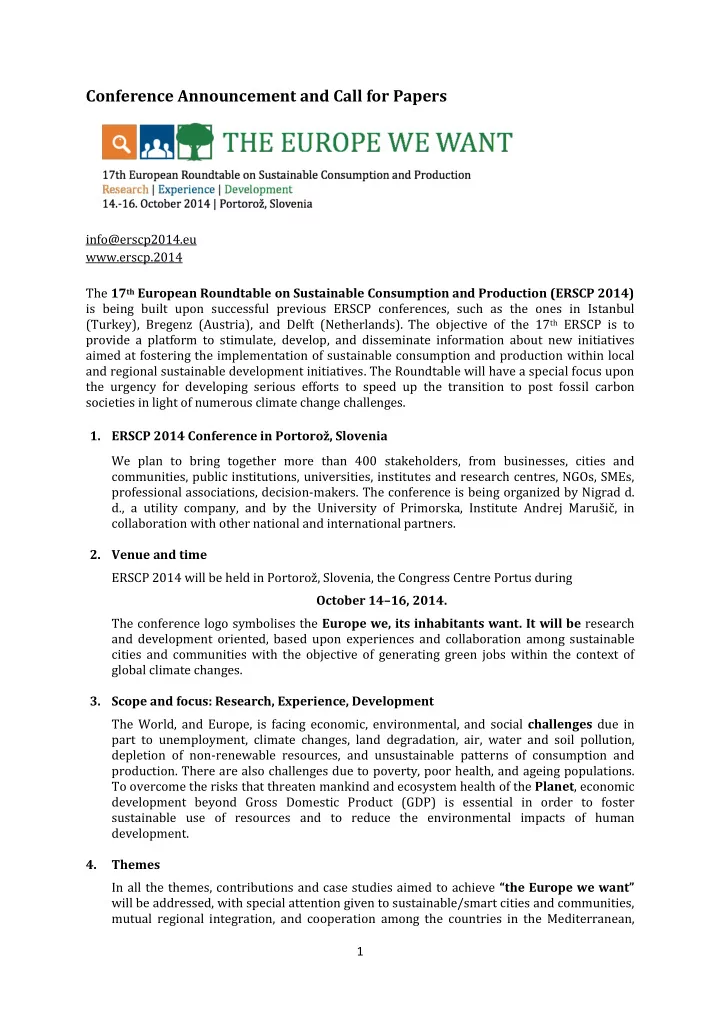

Conference Announcement and Call for Papers info@erscp2014.eu www.erscp.2014 The 17 th European Roundtable on Sustainable Consumption and Production (ERSCP 2014) is being built upon successful previous ERSCP conferences, such as the ones in Istanbul (Turkey), Bregenz (Austria), and Delft (Netherlands). The objective of the 17 th ERSCP is to provide a platform to stimulate, develop, and disseminate information about new initiatives aimed at fostering the implementation of sustainable consumption and production within local and regional sustainable development initiatives. The Roundtable will have a special focus upon the urgency for developing serious efforts to speed up the transition to post fossil carbon societies in light of numerous climate change challenges. 1. ERSCP 2014 Conference in Portorož, Slovenia We plan to bring together more than 400 stakeholders, from businesses, cities and communities, public institutions, universities, institutes and research centres, NGOs, SMEs, professional associations, decision-makers. The conference is being organized by Nigrad d. d., a utility company, and by the University of Prim orska, Institute Andrej Marušič , in collaboration with other national and international partners. 2. Venue and time ERSCP 2014 will be held in Portorož, Slovenia, the Congress Centre Portus during October 14 – 16, 2014. The conference logo symbolises the Europe we, its inhabitants want. It will be research and development oriented, based upon experiences and collaboration among sustainable cities and communities with the objective of generating green jobs within the context of global climate changes. 3. Scope and focus: Research, Experience, Development The World, and Europe, is facing economic, environmental, and social challenges due in part to unemployment, climate changes, land degradation, air, water and soil pollution, depletion of non-renewable resources, and unsustainable patterns of consumption and production. There are also challenges due to poverty, poor health, and ageing populations. To overcome the risks that threaten mankind and ecosystem health of the Planet , economic development beyond Gross Domestic Product (GDP) is essential in order to foster sustainable use of resources and to reduce the environmental impacts of human development. 4. Themes In all the themes, contributions and case studies aimed to achieve “the Europe we want” will be addressed, with special attention given to sustainable/smart cities and communities, mutual regional integration, and cooperation among the countries in the Mediterranean, 1
Central Europe, and South-Eastern European areas as together we learn from experiences from Nordic, Western and Asian countries. Based upon responses to the Call for Papers, the final themes of the ERSCP Roundtable will be elaborated into sub-themes. The following main themes will form the framework of the 17 th ERSCP: 1. Improvements in Resource Efficiency, Sustainable Production and Improved Process, Product and Service Design 2. Experiences with Sustainable/Smart Cities and Communities 3. Advances in ‘ R eal’ Sustainable Consumption and Beyond GDP Initiative 4. New Initiatives in Education for Sustainable Development 5. Results of Sustainability Innovations Research and Development 6. Exciting High-Tech for Sustainability in Industries 7. Challenges for Making Progress in Cross-Cutting Themes Including Green and Inclusive Entrepreneurship and Sustainable & Ethical Investments Pollution Prevention, Cleaner Production, process intensification, voluntary improvement approaches, enhanced resource efficiency, energy and mass integration, co- and poly- generation, renewable energy and materials resources, industrial ecology, circular economy, supply and value chain optimization, zero waste, waste minimisation, design for environment, eco-design, sustainable product-service systems, (eco)design for sustainability, integrated pollution prevention and control, best available techniques, best practices and case studies, environmental management systems, and corporate reporting are examples of the key words on sustainable production and design . Environmental policy, triple bottom line, decoupling, environmental law and ethics, changing life-styles and personal behaviour, footprints, partnerships, global cooperation, industrial-regional symbiosis, social responsibility, ecological economics, externalities, green purchasing, eco-labelling, passive buildings, water stress, sustainability indicators, food, mobility, sustainable tourism, grass-root innovations, collaborative consumption, sharing economy, design for sustainable behavior, and sustainable well-being are some of the watch words of sustainable consumption . In the last years, a wide range of initiatives, experiments, actions and models for sustainable living have been proposed within Europe and in neighbouring countries; however, enablers, solutions and pathways to overcome barriers for scaling-up and moving towards new, more sustainable economies still need to be detailed and implemented. Increasing their visibility and strengthening links between/among them are parts of the often-mentioned theory of change. At the macro level, the Beyond GDP initiative can help in adapting production and consumption to new boundary conditions and to pave the way to both, Gross National Happiness and the Happy Planet. Cities and communities are contributing to unsustainable consumption patterns and hence have a significant impact on the environment. The sustainable, “ smart ” cities and communities’ concepts are based upon integrated approaches that encompass innovative, sustainable and inclusive dimensions of an intelligent city. They are designed to ensure that natural resources are produced, processed and consumed in a more environmentally sustainable way by simultaneously integrating information and communication technologies, public services, the local economies, and social life into a more humane urban infrastructure aiming at sustainable urban management and better living conditions. The concept of sustainable cities and communities represents progressive and interoperable integration of public utility services , which are still at the initial stages both in Europe and around the world. Sustainable, smart infrastructure is one of the most important research and development areas at the global level. It relates to the development 2
Recommend
More recommend